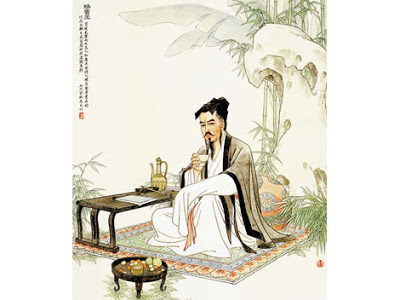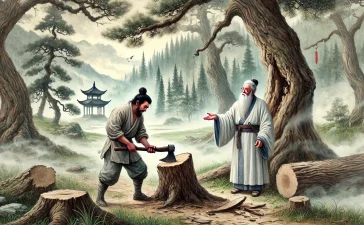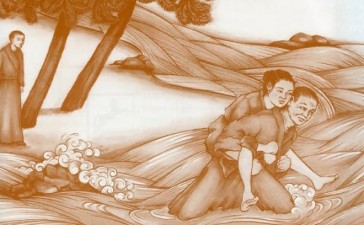This tale came about when my mother and I were watching a documentary on video one evening. The documentary was about a well known Chinese poet and writer named Jiang Yan.
Jiang Yan’s poetry and essays were highly regarded across China during the South & North Dynasties.
Although Jiang Yan came from a very poor family that did not stop him from studying hard and following his passion to become a writer. In his time, Jiang Yan achieved fame as a poet as a young man. The people across the nation loved him and recognised his work everywhere. There was so much talk about his brilliant poetry.
By the time Jiang Yan had reached his middle age he was distracted by fame, wealth and comfort. He felt that he could no longer produce works of quality as he once did as a young poet. At the time there were many rumours and theories put about why Jian’s ability to create had declined.
Chatting with my Mum after the documentary she told me the tale that she had heard as a young girl about why Jiang Yan lost his creative spirit.
One sunny summer day Jiang Yan took a boat ride on the river near the Tangling Temple and fell into a deep sleep as the small boat slowly traveled down stream. As the sun danced and shimmered off the water Jiang Yan dreamt of two old friends. In the dream one of his friends demanded that Jiang return the roll of silk fabric that he had borrowed long ago.
“What does that mean Mum?” I asked. “That doesn’t make any sense.”
“Ah, my little one,” my mother explained. “In ancient times silk was regarded as a symbol of power and wealth. So by being asked to return the roll of silk he was being asked to give up all his influence and wealth.”
Mum continued telling her tale…
Then in the dream another of Jian’s friends made his demand. He wanted the return of a multi coloured brush that he had lent to Jiang in the days before Jiang achieved fame and fortune as a great poet.
“What does the pen symbolise Mum?” I asked.
“The pen symbolised his writing ability Little One.” Mum said.
I was reminded of this tale the other day.
So, what’s the moral behind this story?
It’s not as if Jiang Yan suddenly lost his talent to write and compose great poems. The truth is that once he found fame and started to enjoy the lifestyle that this fame and fortune brought him he started to let go of his passion and moved his focus to other the other aspects of his life, like his official government job, and protecting his privileged position.
His creative passion, and composing great poems were no longer his priority as he no longer need them to earn his living. Bedsides that, he was proud to have achieved the great heights of his official career. It was another reason that he did not need to write any more.
I’m grateful to my mother for telling me this tale and reminding us about how we could lose sight of our own destiny if we don’t really know what we want from life. We could work hard to build a Business LifeStyle only to find that down the track we lose it through lack of focus.
Now let’s look at how we could apply the story into our Art & Design Practices:
• Don’t fall for distractions & shinny objects (insert link).
• Don’t get too comfortable. Remember to pay attention to the three critical areas in your Business LifeStyle:
• Working On your Business
• Working In your Business
• Working Above your Business
• Stay in touch with your passion and check in regularly to ensure that your passion is still in line with your business.
• Whether you have a passion to create, or a business to run, the key to success is to nurture your talent, to establish clear goals. and to stay focused on those goals.
• Whatever you do, keep your passion and business inspiring and interesting. Nothing kills a Business LifeStyle quicker than boredom.
More Tales My Mother Told Me…
Volume 2:
Tale 3: Talking about army on paper.
Tale 4: Being Persistent
Tale 5: A Poet’s Writing Skills Decline
Volume 1:
Tale 2: “Your Mind is Powerful”
Tale 4: “Being Compassionate”
Tale 6: “The Magic Pen”
Tale 8: “Confidence & Competence”
Tale 9:“Being Present”
Tale 11:“I never see what has been done; I only see what remains to be done”
Tales12: “Frog In The Well”
Tales12: “Frog In The Well”






